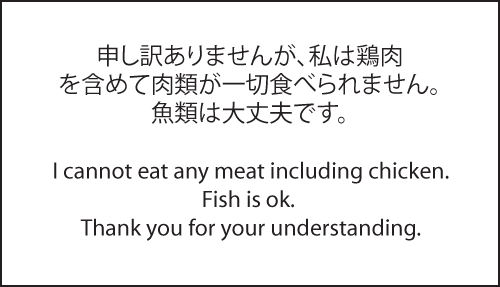A relative's doctor commanded him to eat NO meat to prevent Alpha-gal allergy, hypertension, and LDL cholesterol. His doctor says he can still eat seafood.
We don't speak Japanese, but we plan on travelling to Japan after COVID. In the 2019 EF English Proficiency Index, "Japan dropped to 53rd in global English proficiency, squarely in the “low proficiency” band." We're thinking of printing our question on paper. Then we'll email the question to restaurants if we're booking, but some Japanese restaurants play Hard-to-Get and don't accept reservations. If we're walking in, we'll show the paper to
Japanese restaurant staff before we enter.
and chefs who work behind the counter. kaiseki or omakase chefs pick ingredients for us, and we can't pick ingredients. I want them to see our paper just for assurance. Can someone proof read Google's translation please? Japanese Stack Exchange bans translation requests.
Sorry, I don't speak Japanese. I translated this with Google, so please forgive any rudeness.
I can't eat meat for medical reasons, but I can still eat seafood. Can I avoid meat at your restaurant? Can you guarantee not to serve me meat?
すみません、日本語は話せません。私はこれをグーグルで翻訳したので、無礼を許してください。
医学的な理由で肉は食べられませんが、シーフードは食べられます。 あなたのレストランで肉を避けてもいいですか? 私に肉を出さないことを保証できますか?

